"My Master is the Beginning and he is the End. He is the Master of mortals, and the core of our Dead Hearts. Deny him and you deny yourselves. Honour him, and acknowledge he to whom we owe it all."
- —The Saga of Khorne.[3j]
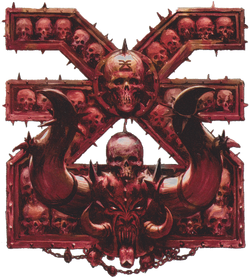
The Bloody Symbol of Khorne.
Khorne, also known as Kharneth,[3l] the Blood God,[3a] the Lord of Murder[3k] and the Hunter of Souls, is the Chaos God of War, Honour, Courage, Rage, Strength and Hate. His domain of power encompasses the most basic and brutal of sentient emotion and every act of killing is said to empower Him, the more vicious and bloodthirsty the better. He is said to smile upon feats of valour, strength and blood-drenched warrior skill, and is the patron of proud warriors who set themselves against the odds and emerge triumphant through strength and skill.[3g] Khorne is said to exalt the brave of both sides of the battle, while at the same time laying his terrible vengeance upon the cowardly and craven.[1f][2a][2b]
On one side of his nature, Khorne is the embodiment of honour and courage, and a man that has put his faith in Khorne is just as likely to be an honourable warrior as he is a blood-crazed killer, and oftentimes he will be both at the same time. The Warriors of Khorne, though gore-maddened berserkers all, take no artful approach to killing, for such indulgent displays serve only to empower Slaanesh, the honourless adversary of Khorne amongst the company of the gods. It is also due to the warrior-code of the devotees of Khorne, who believe it is the solemn right of every warrior to die an honourable death in battle with sword and axe in hand. Khorne is the second eldest and perhaps the mightiest of the Gods of Chaos.[1f][2a][2b][3a]
Khorne is known by a thousand, thousand names in the North. He is known as Kharneth, Akhar, Kjorn, Khorgar, the Axefather, the Bloodfather, the Bloodwolf and the Wolf-Father, and yet other uncounted multitudes of titles and aspects.[1f] The Blood God is worshipped by almost every tribe in the North, for the Northmen are warrior-peoples who exalt in the contest of arms. Particularly the Norscans, who most eagerly of all embrace Khorne's call to eternal warfare.[2a][2b][3a]
Manifestation
"Our Blood Lord has given us many great blessings this night. The sacrifices must have appeased his almighty rage, for the blood in our skull chalice became still. I drank deeply from the cup, and felt renewed with almighty strength. I have no recollection of what occurred next, but when I woke, the other seven were all dead. They were ripped to shreds, reduced to ooze upon the floor, bones ground to dust! What almighty power has my Lord gifted to me? There is still blood left in this sacred vessel. Tonight, I shall sip once more, and let the great wrath of Khorne descend upon this city. I will sacrifice myself and all others who try to oppose me. Blood for the Blood God! Skulls for the Throne of Khorne!"
- —From the diary of a Crimson Skull Cultist, found by Witch Hunters in Talabheim.[1d]
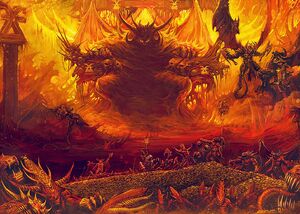
Khorne upon his Brass Throne.
Khorne, the Blood God, sits resplendent in his rage upon his brass throne, resting atop a mountain of bloody skulls, built from the countless heads of great champions his followers have slain over an immeasurable number of eons. No mortal man would be able to lay their eyes upon Khorne and survive, but various heretical writers have suggested that the Blood God looks somewhat like one of his mighty Bloodthirster greater daemons, only infinitely more terrifying. Khorne sits upon his throne, encased in his brass armour, capable of deflecting any blow, clutching his colossal sword that could carve continents into pieces, his eyes burning with endless fury in the centre of his dog-like face. Khorne is said to have mighty forges and armouries that run for leagues, belching sooty filth into the lightning-cracked air, yet he will forever favour this single combination of arms. His mighty throne room, built atop of his great brass tower, is supported by eight gigantic brass pillars in honour of the sacred number of the Blood God.[4a]
The room itself is filled with his favoured flesh hounds, including the mighty Karanak, blessed with three heads and far more powerful than the rest of his kin. Some have described these loyal beasts as a bodyguard to Khorne, but to him they are but pets, as the Blood God has never been bested in mortal combat and thus needs no protection. Even if another of the Ruinous Powers were to enter the brass tower, Khorne knows that he alone would prove triumphant, such is his infinite strength and skill. The tower itself rises leagues into the blackened sky, surrounded by a moat of molten blood, filled with the screaming enemies of Khorne, whilst the blackened brass walls are filled with monstrous carvings that depict the endless rage of the occupant within. Khorne puts none of his will into any endeavour that does not cause bloodshed.[4a]
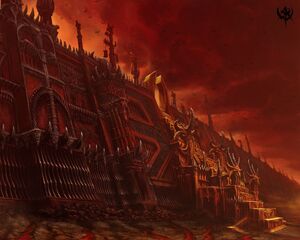
Khorne's Bastion Stair.
His lands in the Realm of Chaos are barren, cracked and dry save for the ceaseless rivers of blood fuelled by endless combat. Throughout his realm, legions of warriors fling themselves into combat purely for the sake of battle. Khorne cares not from where blood flows and skulls are sacrificed so long as it is done in his name. It is not uncommon to see the warriors and champions of Khorne fighting amongst themselves, duelling and battling to prove their skill in combat and rise higher in the eyes of their Lord. Khorne disdains magic; to him, only bloodletting through physical combat is acceptable. None of his followers are permitted to be sorcerers, although some will carry magic-imbued weapons or armour in order to augment their killing ability.[4a]
All of Khorne’s daemons are built to kill quickly and efficiently. Khorne is also the least subtle of the Chaos Gods. While the troops of the other Ruinous Powers may fall back to recover or bring other talents into play, the daemons of Khorne always fight to the death. Cursing their enemies, their mounds of sinewy muscle carving their last steps through the front lines, Khorne’s daemons continue to spill blood and claim skulls until the last roar of defiance and rage from their gaping maws has been silenced. Then their bodies, further sacrifices to the Lord they served so faithfully, are crushed to dust and ash by the next wave of his blood-crazed troops, all along screaming endlessly ‘Blood for the Blood God, Skulls for the Throne of Khorne!’ as they pour into glorious combat.[4a]
Relations to Rival Power
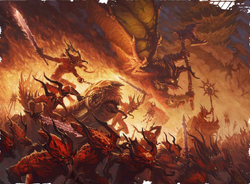
The Legions of Khorne further the cause for their master.
The Ruinous Powers often spend more time concerned with besting their rival gods than trying to implement their carefully crafted plans upon the Old World. Khorne, however, has an understandably difficult relationship with the other powers. Khorne has such a different philosophy that the others find it difficult to understand him. The Blood God loathes magic, and yet all of the other powers are wielders of powerful magic. This alone would mark Khorne aside from all of the other powers, but the conflicting desires and ideologies of Nurgle, Slaanesh and Tzeentch are so opposed, it becomes clearer why these immense powers spend so much of their energies in conflict with each other. Nurgle is abhorrent to Khorne.[4c]
The Lord of Decay sits and waits in his pestilence, and if it were his way, would wait for eons for his plans to come slowly to fruition. Nurgle is quite happy for his followers to avoid direct combat, instead allowing them to simply spread disease and plague. To Khorne, this approach does not have the honour of bloody combat. Khorne revels in direct action and the passive approach of Nurgle is totally at odds with the Blood God’s principles. The Plague Lord’s followers often refer to their master as ‘father’ or ‘grandfather’ Nurgle, and truly see the pestilent mutations and diseases that wrack their bodies as great blessings from a doting relative. Followers of Nurgle, surrounded by flies, are bloated, disease-ridden abominations that would make even a strong-stomached man empty the contents of his stomach over the floor. However, to Nurgle, his followers have been ‘improved’ by the mounds of rotting flesh and pustules covering their abhorrent bodies. Nurgle is a God who believes that his goals will be achieved through careful building and stewardship of his blessings, whereas Khorne only cares for destruction.[4c]
Tzeentch delights in baiting Khorne. The Changer of Ways is the most confusing, subtle and maddening of the Ruinous Powers. Khorne is not unintelligent, but he has no time for subtlety, and his rage consumes more complicated emotions. Tzeentch therefore plays tricks upon Khorne for his own amusement, which Khorne responds to in the only way he knows how: violence. The Changer of Ways is also the greatest source of magic amongst the Chaos Gods and Khorne does not look kindly upon this fact. Tzeentch, in Khorne’s estimation, is a coward cringing behind a wall of trickery and simple conjuring instead of having any real power. He is a weakling, sustained only by the Aethyr.[4c]
If his source of power were to diminish, then Khorne would raise his forces and crush the home of the Changer of Ways – the Impossible Fortress. One might imagine that Slaanesh possesses the ideology closest to Khorne’s. He is the Prince of Pleasure and of Pain. And while no one can deny that Khorne’s legions cause unbelievable pain, Khorne does not actually aim to cause suffering. Indeed, of all the Chaos Gods, Slaanesh is the most diametrically opposed to Khorne. Slaanesh is a patron of the arts and loves aesthetically pleasing objects. His followers are brought in through their taste for decadent pleasures. Slaanesh seeks to inwardly draw his followers in, ingratiating them slowly as their taste for pleasure or pain becomes harder to satiate, requiring more and more perverse acts in order to feel anything at all.[4c]
Decadence begets perversion, which begets abomination and utter depravity. And it is this methodology that is alien to Khorne. The Blood God has no time for pleasure or eroticism; indeed all feelings are wasted except rage, hate and vengeance. Slaanesh also corrupts people from within, building on their inner thoughts and desires. Khorne always builds from without, focusing on outer strength and power. Slaanesh would delight in a grotesquely obese follower, gorging himself upon expensive delicacies, but Khorne cares only for muscle and sinew, to give strength in battle. Khorne seeks to cause death; Slaanesh lets his followers enjoy life to the fullest, fulfilling their most perverse desires. These two Gods are constantly at war with one another, each believing that they have the upper hand, or can soon gain it, in their endless struggle. It is to the constant relief of the Old World that the Chaos Gods have not united under their one common aim to destroy all existing civilisation.[4d]
Personification
"The mouth is opening, red creatures pouring from the maw. The land is burnt and bare. The sky is ablaze. Men are fallen and armies scattered by his might. And then there comes a hero and he wields the weapon of the lord and he does smite his enemies. And the hero and the weapon become one, and the land is lost."
- —Old Yak’s Rant.[1i]
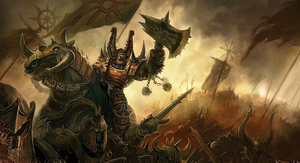
A Khornate army on the warpath.
Khorne may not be the subtlest of the Ruinous Powers but that is not to say that he does not have goals and ambitions to fulfill beyond seeing blood spilled in his name. His rage may be infinite and endless, his fury immutable, but Khorne has a savage intelligence, seeing the need to lay seeds for his destructive plans to pay off in the future. Khorne revels in a man who seeks glory; for in Old World society, this leads frequently to feelings of anger at one’s enemies and a need to see them dead. Others may turn over to the Ruinous Powers in order to have their ambitions fulfilled. Examples include the militiaman who simply dreams of having the strength to repel his foes in order to see his wife and young child again, or the aging knight who wishes the strength of his youth still coursed through his veins.[4d]
At the same time, many despair at their fate, and whilst Khorne finds this pathetic, he may still bestow blessings upon these wretched souls. Sometimes, there is no better servant than one who is picked up at the lowest ebb and given his wish. The hearts of this kind of man often burn most fiercely for Khorne. Some servants of Khorne come willingly; others are slowly drawn in. There is a fine line between justice and vengeance, and in seeking revenge many people cannot control the nihilism and anger within themselves, which spills over into a fury that cannot be purged from their body. This leads them into direct exposure to the principles Khorne espouses and far too often the wrath has so consumed the person that inevitably the Blood God then consumes their very soul. For Khorne’s order to be imposed across the Empire, he first requires anarchy.[4d]
If the established order of Emperor Karl Franz, the Grand Theogonist, and the Temple of Sigmar has been overthrown, the Old World will be critically and permanently weakened. More and more it appears as if the old races, the dwarfs, the elves, the slann, no longer have the numbers to withhold the advances of Chaos without relying on the relatively undeveloped but numerous humans. Anarchy itself gives special pleasure to Khorne in comparison to his rival gods because in times of anarchy, there is inevitably conflict. And when there is such widespread bloodshed, it is inevitable that skulls shall by lifted into the air by bawling, muscled warriors offering their sacrifice to the Blood God.[4d]
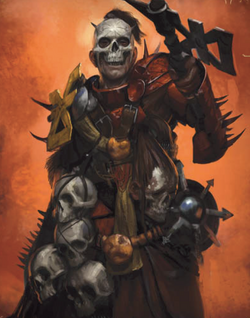
Cultist of Khorne.
Khorne loves to see mindless destruction and violence; the looting, decay, and devastation that come with the fall of organised society all feed his lust for wanton destruction. Khorne is not associated with subterfuge, but from his Brass Tower, the will that he imposes upon his followers has been confused by many a man. In the heat of a raging battle, warriors call upon their gods for strength, but it may not always be the guiding hand of Ulric or Sigmar that answers the mortal men who petition the deities, but the Blood God. Equally, cultists of Khorne can occasionally show a modicum of patience and foresight compared to their patron. Throughout the Empire, cults such as the Crimson Skull, the Flayed Blood and the Wrath of Khorne scheme and plan.[4d]
These sects secretly turn the minds and souls of warriors into mindless minions of Khorne. Often, soft-minded warriors are their target, lured into a group they initially believe worships Sigmar or Ulric. All of the Ruinous Powers strive to achieve dominion over the world and the life that crawls about its daily drudgery with have no concept of the beings of pure power that inhabit the Realm of Chaos. Khorne, however, strives for more than simple control. He looks for utter dominance. This is a trait often found in his followers, as they have been known, even in battle, to turn upon each other, duelling till the death. For aspiring warriors of Khorne, there is no goal, no feat that is more desirable than inflicting utter defeat upon a champion of the Blood God, and Khorne actively encourages this attitude amongst his followers. Khorne is not a being that any mortal can claim to have seen; yet his very name inspires fear.[4e]
Those unlucky enough to have set eyes upon his daemons will no doubt suffer nightmares until their dying day and know that their very survival was a miracle, even if the mental scars remain. Those that have faced his warriors in battle know of the frenzy, the bloodlust and the almighty strength and power that lets these brutes carry on even after receiving what would be a mortal wound to an average man. And the stories of these battles inspire fear in the citizens of the cities, towns and villages across the Empire, and across the Old World. And Khorne can profit from fear. Whole battalions of elite troops have been known to turn tail and attempt to escape from his daemonic hordes, but this inevitably leads to their slaughter. Sometimes this fear can even attract followers. Some can no longer see the influence of Sigmar, Taal, Shallya, Rhya, or any of the Imperial Gods upon the land, but they have witnessed the ravening power of the Chaos Gods. Thus, believing that the world as they know it must be nearing an end, this kind of person seeks to worship Chaos in an attempt to save his soul when the inevitable end arrives. Merely by his reputation, and the furious rage of his servants in battle mimicking the personality of their liege, means that Khorne has become a far more dangerous and powerful foe, and he seeks to spread fear throughout the Old World.[4e]
Plots and Purposes
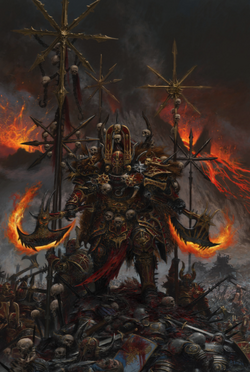
Egil Stryborn offering up the skulls of his enemies.
Khorne requires blood. Khorne requires skulls. Khorne requires violence, destruction, and utter subservience to this cause. His blessings are not a sign of kindness, love, devotion, or even care. They are a means to an end, designed to increase the efficiency of his killing machines, driving them on to greater acts of ferocity. If Khorne does not care about the lives of his minions, the minions themselves seem to care even less. The hate that fills them eventually dominates their every thought. Driven onwards in battle, Khorne’s followers eagerly sacrifice themselves to the blade and retreat is never an option.
The Blood God himself sits impassively; he simply seeks out destruction and bloodshed and cares not from where it comes. His indifference does, however, mean that Khorne is always in need of new champions. There is a dual purpose to this need. When a warrior falls, a new one is needed to step into the breach, to take his place so that Khorne can gain the upper hand in his struggle against the other Ruinous Powers. Secondly, fresh blood can test his existing champions. If they meet in a challenge, then Khorne can only benefit. If the existing champion emerges victorious, then he will have learned something from the warrior he has just defeated, increasing his already impressive skills with his chosen weaponry.
If the challenger walks away alive from the combat, then the defeated warrior was a weakling and unfit to serve Khorne. His body will make a meagre sacrifice, but no more. Through this brutal and bloody system, Khorne slowly builds up the strength and power of his forces, waiting for the moment he can unleash them upon the unknowing world. Khorne does have more minor plans than defeating his rival gods and destroying civilisation, however. Khorne realises that it is unlikely that the world will fall in one swift motion and so he looks to build his influence, spreading destruction, anarchy, and death wherever possible. The Blood God‘s marauders and warriors look to test the boundaries of the Empire and Kislev, probing for weaknesses and identifying suitable invasion points. These raids gradually weaken the defences of the two nations, which take time to rebuild, whereas Khorne has an endless supply of eager warriors.
Gifts of Khorne
The greatest of Khorne’s servants sometimes ascend to daemonhood. While some will not have the physical or mental strength to accept such an abundance of gifts, devolving into mindless, gibbering chaos spawn, others will gradually take on a more impressive stature, growing free of their mortal shackles. For instance, the mortal body of Valkia the Bloody, consort of Khorne, has been almost totally transformed; her upper body has grown horns and wings while her lower torso resembles that of a Bloodletter more than that of a woman. Whatever gifts are bestowed, those with the Mark of Khorne look to seek out and challenge others worthy of combat, especially other devoted Khorne worshippers. The Blood God favours those who sacrifice friends, allies, and enemies alike to him, and there is no greater trial than to destroy another Khornate warrior in mortal combat. Any beast of Chaos can be gifted with a Mark of Khorne, a symbol of the god’s blessing, although this special gift is most often given to the strongest and most ferocious among them. Additionally, Khorne can also bestow his gift upon certain chosen warriors and marauders. These mighty warriors are filled with a mere portion of Khorne’s rage and yet it propels them into battle like they have been possessed. Warriors bearing the Mark of Khorne are more muscled than their comrades and have some other outward sign of the blessing they have received, such as red eyes, tears of blood, or great brands burned into their chests and arms.
Followers
"Our Blood Lord has given us many great blessings this night. The sacrifices must have appeased his almighty rage, for the blood in our skull chalice became still. I drank deeply from the cup, and felt renewed with almighty strength. I have no recollection of what occurred next, but when I woke, the other seven were all dead. They were ripped to shreds, reduced to ooze upon the floor, bones ground to dust! What almighty power has my Lord gifted to me? There is still blood left in this sacred vessel. Tonight, I shall sip once more, and let the great wrath of Khorne descend upon this city. I will sacrifice myself and all others who try to oppose me. Blood for the Blood God! Skulls for the Throne of Khorne!"
- —From the diary of a Crimson Skull Cultist, found by Witch Hunters in Talabheim.[1e]
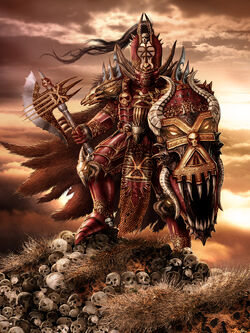
A Khornate Chaos Lord.
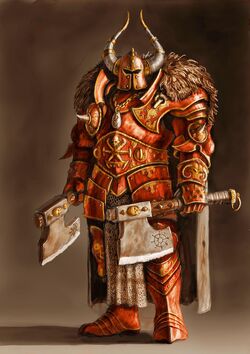
Most Chaos Warriors of Khorne wear crimson coloured armour as a symbol of their allegiance.
Khorne draws fewer true cultists than the other Chaos Gods. Tzeentch can provide great magical prowess, Slaanesh can bestow gifts of intense pleasure or pain, and Nurgle can provide mastery over plague and disease. Certain groups are often attracted to one of the Chaos Gods in particular. Acolytes, hedge wizards and sorcerers may be drawn to Tzeentch, doctors, alchemists and barber-surgeons to Nurgle, the wealthy and pleasure-seekers to Slaanesh, and warriors to Khorne. Khorne provides less subtle gifts than the other three and the strength and power that he can bequeath make him an obvious temptation for warriors. Of course, many of his followers do not realise the true corrupting power of Chaos and have no idea that eventually they will be fully consumed by the gift of rage that the Blood God provides.[4f]
Some people can resist longer than others, but weaker minds are quickly overcome by the strength writhing within them and become mindless killing machines. The weakest succumb to the Realm of Chaos completely, warping into a mere parody of their former selves as slavering chaos spawn. If a warrior pleases Khorne, he has been known to continue to bless his chosen so he might better carry out the will of the Blood God. While one cultist in a million may eventually step upon the path to becoming a daemon prince, the rest will, at some point, have their bodies fail to accept the changes thrust upon them. Scyla Anfingrimm was once one of Khorne’s greatest champions, a warrior of immense strength hailing from the Northern Wastes.[4f]
He killed by the thousand and received many rewards from Khorne until, at last, his wasted body collapsed and transformed into a spawn. Although Scyla still curries the favour of Khorne (unlike other chaos spawn), he is now fated to forever walk across the blasted, snowy wasteland, consuming all that he encounters. Khorne’s power to transform and recreate flesh should not be underestimated, as the story of his consort, Valkia the Bloody, demonstrates. Once a great warrior queen of the North, Khorne looked upon her with something almost approaching fondness until she perished in battle. Wracked with a rage that could have carved nations in two, Khorne set about rebuilding Valkia’s broken body. He raised her from death and made her part daemon prince, so that she would never fall again. Her body now sprouts great leathery wings, and from her forehead burst forth two massive horns, adding to her already considerable might. She now stays with her lord, master and consort, often commanding his armies within the Realm of Chaos. The day she flies against mankind will be a day untold thousands breathe their final breath, such is the power Khorne has infused in her.[4f]
Northern Tribes
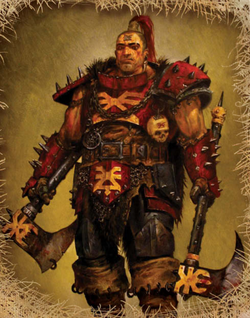
A Khornate Norscan.
Over the centuries, raiders from above the Sea of Claws have always targeted Kislev and the northernmost provinces of the Empire. These raids have become increasingly brutal and deadly as the taint of Chaos spreads across the Northern Wastes. In times gone by, these battle-hardened Marauders and Kurgan forcibly settled in the areas they targeted for pillaging and claimed a local wife. Over time, as the grip of the Ruinous Powers upon the world has increased, their strength in the Northlands has grown exponentially. The taint of Chaos is ever-increasing and has always been stronger in the North due to the close proximity of the gateway into the Realm of Chaos. For this reason, the hard warriors of the North have always worshipped the Chaos Gods, even if the names of these gods has been warped along with the minds of the Norscans, Kurgan, and other tribes that periodically launch raids on the civilised settlements to the south.[4f]
While all tribes recognise the Chaos Gods as their masters, they may pray and shout to a different name, but it is always Khorne or one of the other Ruinous Powers that is listening and responding to their cries. Thus, the raids from the North not only seek to find women, food, and gold for the sake of survival, but also blood for the Blood God. When the fur-cloaked warriors emerge from their longships onto the beaches, their aim may not be to pillage, but to kill, maim and destroy in the name of Khorne or one of the other Chaos Gods. The Northlands are a savage wasteland; few who choose to live there have any ambition other than to become a great warrior and face the judgement of their god by travelling to the far North.[4f]
Those few that return often come back bearing a great scar, brand, or tattoo, a mark of the favour they have received by becoming a chosen servant of their deity. Faith and honour have been wiped from the mindset of these peoples, thrown away for a craving for the blessings of the dark powers. Most of the livestock brought back from raids is sacrificed and any weaklings found among them are thrown onto the same pyres. The tribes are in a state of constant strife, both with each other and with the lands to the South. In Kislev, where the border is less constant than the sea, the Ice Queen has been forced to reinforce the defences of Praag and Erengrad against the increasing ferocity of Norscan attacks. Despite the greater quantity of attacks, the only facet of society remaining is loyalty to kin. Few dare to displease their family elders, for to do so will lead to being cast out into the wilds, with little chance of being accepted by other tribes.[4g]
Civilised Nations
The Old World is a grim and dark place for all of its inhabitants. It is a bloody and violent continent, from the Kurgan and Marauders in the North, to scimitar-wielding troops from Araby in the South. The human inhabitants of these lands, despite thinking themselves civilised, are just as brutal as some of the so-called ‘lesser’ races. The Empire may be the greatest of these nations in terms of raw power, but its citizenry is also the most ripe to be turned to the causes of Chaos. Even so, the Empire has warred, at times, with all of its neighbours, spilling the precious blood of men rather than focusing on the far greater threat posed by Chaos. Surrounded by enemies, the Empire must also guard against attack from orcs, goblins, the undead, beastmen, skaven and ogres. Not a day in the Old World passes without conflict and bloodshed.[4g]
From the snow-filled North, to the wastes and deserts of the South, thousands lose their lives each day as the engines of war march ever onwards. Peace rarely lasts long. Men are ambitious and too willing to break treaties. Bestial creatures retreat only to gather their strength for renewed assaults. Magical entities are summoned, both by accident and design, into the world to wreak havoc. The constant strife brings what might be described as pleasure to Khorne. The Blood God cares not for pleasure, leaving such ridiculous emotions to the hated Slaanesh, and feels only rage and hate. But the destruction energises him, feeding his hate. He then uses that energy to incite greater acts of murder from his followers.[4g]
The Chaos Gods find that the beastmen make useful minions. The cloven monstrosities are born of Chaos, yet unlike daemons, they have all been birthed in the forests, and so can wander freely, unlike some of Khorne’s followers, who require some proximity to the Realm of Chaos in order to be sustained. A warped parody of man and beast, Khorne finds the beastmen’s brutality pleasing. Filled with a loathing for man that has only increased with time, these creatures live to hunt and kill human flesh. Khorne knows that these beasts will continue their quest forever and, like the other Ruinous Powers, rarely concentrates on such lowly creatures. Beastmen serve Chaos regardless, neither comprehending the power of their foul deities nor realising their part in the plans of the four gods. Inside the Drakwald and other forests, the uncounted herds build herdstones to worship the Ruinous Powers, bleating obscene cries as prayers.[4h]
Sometimes Khorne, or one of the other Ruinous Powers will take a particular interest in a single beastman. It will be little more than a disposable pawn, but some beastmen have been known to receive blessings and mutations specific to one of the Ruinous Powers, though this is not common. Beastmen are already ferocious warriors that are fast, agile, tough-skinned, and fully capable of delivering crunching blows with their crude and rusty weaponry. Khorne enjoys that the beastmen are built for battle; whether it is the lowliest Ungor, or the greatest Doombull, the destruction caused by the cloven race can only further his cause.[4h]
Daemons of Khorne
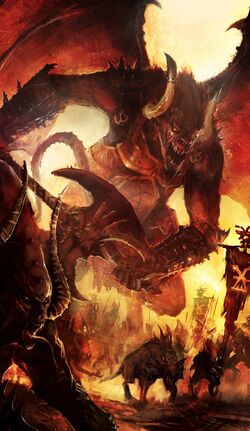
The daemons of Khorne.
The daemons of Khorne are much like their god: raging, bloodthirsty and incomparably deadly. Even the least of their number is a truly terrible foe. Whether this is down to their being skilled warriors, raging beasts, or even both. It is a terrible fate for a mortal man to face a daemon in battle, and it is even moreso when the daemon is of Khorne's vile pantheon, for their overriding purpose as dealers of violent death is only all too obvious.
The Daemons of Khorne are their god in microcosm - unrelenting embodiments of fury and bloodthirsty martial honour. They are the most physically powerful and single-mindedly vicious of all daemonic creatures. Despite being creatures fundamentally of arcane origins, as all daemons are, the creatures of Khorne utilise no sorcery, keeping in with the Blood God's teachings of martial honour. Most, if not all of them, also possess an impressive resistance to assaults of arcane nature. They are beyond any bargaining, and are possessed of the keen martial intellects to rival those of great generals and cunning huntsmen, and bear colossal martial prides that do not easily suffer wounding.
- Bloodthirsters: Bloodthirsters are not only the greatest of Khorne's daemonic creations, but also the greatest of daemonkind entire. Virtual gods of war, they stride the battlefield, their axes meting out death and ruination with even the least of strikes. It is the fury of war given form, the unfettered primal rage of the world made manifest. Such is to be expected of a creature whose only master is the ultimate god of bloodletting, slaughter and murder. A Bloodthirster's iron hard flesh is covered in coarse fur and brass armour, slick with the blood of innumerable victims. The face of the Bloodthirster is like that of a snarling hound, a visage alive with horrific savagery. In one hand it bears an ensorcelled axe that thirsts after death and slaughter, and the other hand it holds a long, barbed lash that can flay away the flesh from a victim's bones with a single crack.
- Heralds of Khorne: Greatest and most fearsome of the Bloodletters are the Heralds, vicious specimens of their kind driven on by their overwhelming, perpetual need for slaughter. The Heralds are the leaders of the Bloodletter hordes, who have gained that position by dint of raw strength and skill in battle. They attack their foes with a fury that eclipses that of lesser Bloodletters, and as their battle-rage grows, those around them become gripped in the throes of berserker frenzy that lends even greater strength to their blows. They hack and cleave their foes until naught remains a mound of corpses and limbs lying adrift a pool of blood, and another victory in the name of Blood God.
- Bloodletters: Khorne's Chosen, the Naked Slayers, the Takers of Skulls. These are the lesser daemonic creatures of the Khornate pantheon, deadly warriors believed to have been the foremost of Khorne's mortal warriors in life and whose will is as implacable and blood-hungry as Khorne himself. Sharp, needle-like teeth stud the daemon's slavering jaws, and rippling muscles lay barely concealed under its scaly red hide, knotted sinews that give the daemon enough strength in its jet black claws to rend apart even the strongest armour. Their might is guided by a killer instinct that surpasses that of mortal men, for a Bloodletter's thoughts are free of any compunction other than to slay Khorne's foes and reap skulls for their lord. Each Bloodletter bears a jagged steel blade known as a Hellblade, eternally wreathed in fire and said to be able to feed on the souls of mortals.
- Flesh Hounds: Flesh Hounds are rapacious wolf-like daemons, with heavily jawed heads both vaguely reptilian as well as savagely lupine. Their razor-sharp teeth and sword-like claws can tear apart both armour and flesh with ease. They are highly capable hunting beasts, able to track prey to impossible levels. The hide of a Flesh Hound is tough and ruddy, with rows of iron plates run into their flesh by iron rivulets in the shape of Khorne's rune. Flesh Hounds are lithe, yet powerful, able to dart aside from a swordsman's strike and pull a rider off his saddle in the same motion. Each Flesh Hound bears a brass circlet about its neck, forged in the heat of Khorne's rage at the great forge that lies in the shadow of the eaves of his great hall. Thus empowered, the Flesh Hounds of Khorne are immune to the effects of hostile magic, for Khorne is loathe to see his servants felled by the perfidious practices of the arcane.
- Juggernauts: Juggernauts are massive creatures part daemon and part ensorcelled steel and sinew. They are mighty beasts of groaning iron and brass, taller than a man and possessed of crushing mass. The hide of a juggernaut is composed of riveted and fused metal plates, decorated with icons of Khorne and bathed in the lifeblood of its victims.
Servants of Khorne
- Valkia the Bloody: Foremost amongst the number of the dread lords of Chaos who follow the Blood God is this fell warrior-queen of Norsca - Valkia the Bloody. Known also as the Shield-Maiden of Khorne, she is said to be the paramour of the wrathful war-god. Khorne is not known for his affections - his passions being chiefly of rage, hate and bloodthirst. Yet the sagas of the Norse teach that he looks upon her with something approaching fondness, this warrior he returned from the dead to carry out his will. Valkia is charged by her master to descend onto the battlefield each dawn and to pay more tithes to his throne of bones, and also to choose those warriors who will fight on in his halls after their death. When Valkia arrives onto the battlefield in her armour of dripping gore and bearing her barbed spear Slaupnir, the warriors of Chaos who honour Khorne fight with even greater vigour, for they know the Blood God watches them, testing their strength, judging their worth, and that to kill forever in his realm is a prize beyond all measure.
- Urlfdaemonkin: Another great daemonic servant of Khorne, and formerly one of his mightiest mortal champions, Urlfdaemonkin, born as Urlf, was once a chieftain of the Snaegr tribe of Norsca - ardent worshippers of Khorne and savage warriors who are the scourge of all southern lands. Urlf was reckoned to be the greatest warrior and leader amongst them, and was raised up to daemonhood by Khorne for his strength. Urlf became venerated by his tribesmen as a lesser daemon-god of Chaos in his own right, and he is summoned by his tribesmen under the moon of his ascension to bestow the blessings of Khorne upon the acting chieftain, on the eve before the warriors of the Hall of the Snaegr take to the south to harvest great tithes of blood and skulls for the Blood God.
- The Skulltaker: Travelers of the Realm of Chaos tell of a fearsome wanderer to appears before the various strongholds dotted throughout the twisted landscape. There, he bellows out a terrible challenge, demanding that the greatest warriors of that fastness emerge from it and face him in battle. Those who do are inevitably slain by the wanderer's berserk fury, for he is Uzuhl, the Skulltaker, first amongst Khorne's Bloodletters. Astride his great Juggernaut, Khul'tayran, he seeks to face the greatest warriors of the mortal and immortal realms and claim their skulls for Khorne's throne. He is swifter and stronger than his fellow Bloodletters, and is said to possess knowledge of every weakness an enemy bears. Even so, the Skulltaker bears a mark upon one of his horns, the hammer blow of Ghal Maraz, a legacy of the time he challenged Sigmar Heldenhammer to battle in the ancient days of the Empire and was bested for the first and only time.
- Skarbrand the Exiled One: Once, the Bloodthirster known as Skarbrand was foremost among the number of Khorne's greater Daemonic servants, having battled long in his lord's name and having won victories beyond counting. In all the infinite years of Khorne's existence, none had placed more skulls at the base of his throne than Skarbrand, or spilt more blood of warrior and innocent alike for his glory, thus did Skarbrand enjoy Khorne's favour like no other. Yet, pride proved Skarbrand's downfall, as Tzeentch fanned the fires of his ego until he sought to usurp Khorne as the Lord of Battles, and one day, while the god's back was turned, Skarbrand summoned all his great strength for a single strike upon him. Though Skarbrand was mighty beyond all comprehension, a destroyer of worlds, who killed entire cities with single sweeps of his axe, he could not hope to harm the Blood God. Enraged at this insolence, Khorne's furious gaze fell upon Skarbrand. Cursing the daemon's name, Khorne took him up in his armoured fist and crushed him, throttling all rationality and thought from the daemon before throwing the daemon deep into the Realm of Chaos. For 8 days and nights, Skarbrand flew through the sky of the Realm of Chaos, lighting a trail of flaming blood until he finally smashed back to the earth. Bereft of all reason and inhibition, the Bloodthirster is now a witless embodiment of unreasoning fury, and slaughters entire worlds daily in his unholy madness. Khorne spares no more thought for Skarbrand, but laughs as he sees the Bloodthirster serving him more completely in damnation than he ever did in glory.
